- Home
- Peter V. Brett
The Core Page 14
The Core Read online
Page 14
“No doubt it’s all the pig I’ve eaten,” Abban said. “If you’ve truly turned your back on Heaven and look to the pleasures of Ala, there is none greater.”
Hasik laughed. “Bold words, khaffit. I doubt any meat can give greater pleasure than I had atop your wives and virgin daughters.”
“As you say, those days are behind us both,” Abban said. “We are eunuchs now, and must take pleasure where we can. Find me a pig, and I will prepare a meal you will never forget.”
“You’ve tried to poison me for years,” Hasik said. “What makes you think you’ll be more successful now?”
It was true. When they were boys together in sharaj, Hasik beat Abban regularly. Once, Abban paid him back with a drop of sandsnake venom in his gruel. Not enough to kill, but Hasik spent a week embracing pain above the waste pits.
There was no proof it was Abban, but Hasik was no fool. The beatings worsened. After that fateful week, Abban tried countless times to poison Hasik in a more permanent fashion, but the big warrior had learned his lesson. He ignored the food lines, simply picking another warrior at random and taking his bowl at mealtime.
Even among the dal’Sharum, where pride often took the better part of good sense, few dared rise to the challenge. Those who did—often at a bribe from Abban—were gleefully broken in front of the other men.
“You have always been difficult to kill,” Abban admitted. “But that is no reason to stop trying.”
“You are not utterly without spine, khaffit, even if you fear to strike at me yourself.” Hasik spread his arms. “When you are ready, come at me. I will allow you one free blow. You may even poison it, if you wish. I will still have time to gouge your eyes and feed them to you. Still time to suck the tongue from your mouth and bite it off.”
Abban turned out his damp pockets, chains clinking. “I have no poison in any event. But Everam my witness, I can roast a pig that will dizzy you and set your mouth to water at just the smoke. Pigskin hardens into a cracking shell, slick with grease, and the flesh beneath will make you wish you had renounced Heaven sooner.”
“Everam’s beard, khaffit!” Hasik cried. “You’ve convinced me! Today we will find a pig and roast it to commemorate our first fortnight together.”
Hasik reached into his wide belt, producing a small hammer. “But first, there is our dawn prayer.”
The wood demon faded to mist and slipped back to the abyss as they talked. Now the sun crested the horizon, and Hasik at last got to his feet.
The hammer—no Sharum weapon—was a simple worker’s tool stolen casually as they fled the ruin of Jayan’s army after the Battle of Angiers. A lump of iron at the end of a stout stick.
But Hasik wielded that hammer like a dama’ting’s scalpel. He twirled it absently in his fingers, limbering them as he came to kneel by Abban’s feet.
“Please,” Abban said.
“What will you offer me today, khaffit?” Hasik asked.
“A palace,” Abban said. “One to put the greatest Damaji to shame. I will empty my coffers and build towers so high you can speak to Everam.”
“I speak to Him daily,” Hasik said.
The foot of Abban’s crippled leg still had its boot, but the other was long gone, his foot too swollen to fit the leather. Hasik had wrapped the foot in rags to keep it from freezing, though Abban welcomed the numbness of cold over the fresh pain each morning.
“Everam, giver of light and life,” Hasik drew a ward in the air, “I thank you this and each day forward for delivering my enemy unto me. I sacrifice him to you as I promised long ago, one bone at a time.”
Abban howled as Hasik grabbed the purple, bloated appendage, pinning it while he searched for an unbroken bone. He had crushed the toes, then moved on to the bones of Abban’s instep, slowly making his way toward the ankle. Abban never dreamed there were so many bones in a human foot.
“Quit whining, khaffit,” Hasik said with a grin. “Sharum break toes every day with little more than a grunt. Wait until I start on your leg. Your hip. Wait until I take your teeth.”
“It would be more difficult to have these lovely conversations,” Abban said.
Hasik laughed as he brought the hammer down. The pain was unbearable, and as his vision began to close in, Abban welcomed oblivion like a lover.
—
Abban slowly regained consciousness, slung over the back of Hasik’s great charger like a sack of flour. The beast’s every step sent waves of dizziness and nausea through him to accompany the ever-present pain.
He gave in to it for a time, weeping. He knew the sounds were like music to Hasik, but Abban had never embraced pain as easily as a Sharum.
Still, even the worst pains became bearable over time, especially in the numbing cold. Eventually, the nausea subsided and Abban came back to himself enough to feel the sting of a snowflake striking his cheek.
He opened his eyes, seeing flurries blowing in the wind. North of them great clouds were gathering. There would be a storm soon.
They were making their way along the Old Hill Road, a paved Messenger road that once connected the Free Cities of Thesa to the chin city of Fort Hill, lost nearly a century ago to the alagai. Prince Jayan had used the highway—abandoned for most of its length—to move his warriors north to attack Fort Angiers.
It felt like riding through a tomb. Jayan sacked the Angierian hamlets and farms along the road, their burnt remnants standing in judgment over Abban, who had encouraged the foolish prince in his mad plan.
Hasik spat. “Pigs everywhere in the green lands, until you want to eat one.”
“Turn left at the next fork,” Abban said.
Hasik looked back at him. “Why?”
Chains clinked as Abban gestured at a distant line of smoke drifting above the trees. “Jayan kept his foragers within a mile or two of the road, but my maps show Messenger paths to hamlets and isolated farmsteads beyond his reach.”
“Good news,” Hasik said. “I may not need to cut anything off you for my supper.”
“I fear you would find it all marble and little meat in any event,” Abban said.
Hasik chuckled as he turned his charger onto the dirt path leading into the woods. Trees were thick on either side, and even in daytime they rode in shadow deep enough to have Abban wary of alagai.
They encountered several farms along the way, oases of cleared land amid the forest. Each was a wreckage, burned out and abandoned, livestock taken and fields picked clean.
Abban was not surprised. Thousands of dal’Sharum, Jayan’s finest, were lost in the slaughter at the gates of Fort Angiers. When the defeat became known, the chi’Sharum turned on their masters or fled, and the remains of Jayan’s army, perhaps ten thousand Sharum, scattered to the wind. Everam only knew if they would re-form into any sizable force, but there were doubtless enough deserters to plague the chin lands for years.
“The chin flame weapons allowed them to hold the gate,” Hasik said, “but they do not have the strength to guard their lesser wells.”
“Yet,” Abban said.
“Today is all that matters, khaffit,” Hasik said. “Tomorrow I may yet see how much meat is truly on your bones.”
The next farm they came upon was not deserted. Abban smelled smoke, but it was not the acrid stench of all-consuming flame. This was sizzling fat and Northern spices, woodsmoke from a warm hearth.
But it was not Northerners they encountered. At least not entirely. Two Sharum moved along the fences protecting the fields and yard, keeping the wards clear of snow. Others stood over a handful of chin working in the yard. They leaned casually on their spears, but the greenlanders were wise enough not to test how quickly they could be put to use. There was noise from the house and the stables.
“They look to be settling in,” Abban said.
“We were not made for these Northern winters, khaffit,” Hasik said, though Abban had never seen him show the slightest bother at the cold.
“Perhaps it would be wise to…” Abban b
egan, but Hasik ignored him, kicking his charger into a trot.
Hasik had opened the gate and ridden into the yard before there was a shout. Nine Sharum came running out to surround his horse, a circle of spears pointed inward.
Hasik spat on the ground. “No one on watch. Who leads this rabble?”
“We’ll have your father’s name first, warrior,” one of the Sharum said. He was bigger than the others and had an air of command about him, though the veil around his neck was as black as any other.
“I am Hasik asu Reklan am’Kez am’Kaji.”
“Jayan’s dog,” the lead warrior said, “left with no one to heel.” The others laughed.
Hasik joined their laughter. “True enough, though I have my own dog now.” He swept a hand over Abban.
All eyes glanced his way, and Abban wilted further under the collective stare. No doubt the men had only just noticed him. Sharum focused foremost on potential threats.
“The Deliverer’s khaffit,” the first warrior said. “Not so proud anymore. Is it true he can turn sand and camel shit to gold?”
“Indeed he can,” Hasik said. “He can sell water to the fish men, and wood to cutters.”
The warrior tilted his head, meeting Abban’s eyes. “It did not save him.”
Hasik showed his teeth. “Nothing could, on my day. Now we have given our names. I ask again for yours.”
“Orman asu Hovan am’Bajin,” the man said. “Welcome to my csar. It is no prince’s palace, but there are slaves and food is plentiful.”
“The Bajin are not returning to Everam’s Reservoir?” Hasik asked.
“Not these Bajin,” Orman said. “Who leads there, now? Qeran? I’ve no desire to become a privateer and spend my life on the water.”
“The monastery, then,” Hasik said. “Dama Khevat still rules there?”
Orman shook his head. “For now, perhaps, but he hasn’t the men to hold it. The fish men will be eager to reclaim the monastery with Jayan’s forces broken. It is the key to striking at Everam’s Reservoir. Why spend a week walking that freezing, demon-infested highway to join a hopeless battle when there is warmth and comfort here? The green lands are soft and ripe for plunder.”
“Wise words.” Hasik glanced about the yard. “Do you have pigs?”
Orman nodded. “The chin slaves eat them. Need to feed your khaffit?”
“He can feed off his fat,” Hasik said. “I thought I would taste one, myself.”
“If that is your wish,” Orman said, “providing you can pay. We have women, as well. Chin women, not much to look at, but under the veils one is as good as any other, yes?”
One of the men whispered in Orman’s ear. The warrior tossed his head and barked a laugh, then met Hasik’s eyes. “They remind me Jayan’s dog was gelded. Women not much good to you, are they?”
Abban tsked, shaking his head. “You will regret that, son of Hovan.”
The man glanced at him. “What…?”
But then he was gasping and doubling over, grasping at the handle of the knife Hasik had thrown, embedded now in his crotch.
The other warriors surged in. They speared Hasik’s charger in the throat, but Hasik wore armor of warded glass beneath his robes, and their weapons skittered off. He was rolling off the beast, spear in hand, even as it reared. Abban was thrown clear, landing heavily on the ground in a blast of pain.
Hasik was a blur amid the warriors. Then the warriors were a blur.
Then everything went dark.
—
Abban woke on a hard wood floor. A fire burned in the hearth a few feet away, stealing the numbness from his wounds and bringing back the pain afresh. There was a woman bent over him, wiping his forehead with a damp cloth.
“You’re alive.”
“I am alive,” Abban agreed. “Though at the moment I wish otherwise.”
“Well I thank the Creator for it,” the woman said. “The new master said any who die will be guided on the lonely path by my family.”
Abban squinted in the light. “New master? Hasik?”
The woman nodded. “He killed three of the Bajin. Cut the stones from the rest.” She spat. “No less than they deserve.”
“The change in rule may seem a relief now,” Abban said, “but you may come to think the Bajin a blessing by comparison.”
“There are no blessings left for us,” the woman said, “in this age of false Deliverers. All we can hope for is to survive.”
“There is always hope in survival,” Abban said. “I have glimpsed the lonely path more than once, but here I lie, still breathing on Ala.”
“The master says you are his chef,” the woman said. “The men will slaughter a pig for you to roast. A celebration for his new tribe.”
“A tribe of eunuchs.” Abban attempted to sit up. “I don’t suppose you have something I can use to poison the meat?”
“If we had, I’d have used it long ago.” The woman held out a hand to pull him to a sitting position. “I’m Dawn.”
“A beautiful name,” Abban said. “I am Abban asu Chabin am’Haman am’Kaji. I’ll need your help if I am to prepare a feast. I fear I will not be able to stand without crutches, and poorly even then.”
“We have a chair with wheels my grandfather used before he passed,” Dawn said.
“Creator be praised,” Abban said. “If you can help me into it, I would thank you. If Hasik wants a feast, we would be wise not to keep him waiting.”
Dawn nodded, leaving the room briefly and returning with the wheeled chair. It was handmade and crude, but sturdy enough to hold Abban’s considerable bulk.
“How many warriors does Hasik have now?” Abban asked as she wheeled him to the kitchen. Three women, one older and two younger, were already at work preparing the evening meal. A few had bruises, and all kept their eyes down.
“Six still able to fight,” Dawn said, “though all walk tenderly now. Two more with broken bones. Three left out in the snow.”
A shriek and a flash of light drew Abban’s attention to the window. It was dark, with snow blown up against the panes. No doubt the Sharum were out clearing the area of demons, eager for the healing magic to soothe their wounded groins.
They won’t grow back, Abban wanted to tell them. Magic would heal the wounds and broken bones, but it would not grow back what was severed.
“And your family?” Abban asked.
“Seven.” Dawn nodded to the other women. “My mother and daughters, my son-in-law, my husband and father-in-law.”
“Did the Bajin kill anyone?” Abban asked, reaching out to sniff at the spices on the rack.
Dawn shook her head. “They didn’t speak a word of Thesan, but it was clear they wanted slaves, not killing.” One of the younger women sobbed at that, and her sister moved to comfort her.
“Survival is hope,” Abban said.
“You’re not like the others,” Dawn said. “You and the new master speak our language, and they treat you…”
“I am khaffit,” Abban said. “A coward. In the eyes of warriors, I am worth no more than you. It will be all our lives if the feast is not satisfactory. Let us look at the pigs.”
Abban shivered as Dawn wheeled him out into the evening snow, crossing the lamplit yard to the slaughterhouse. Sharum flitted about in the darkness beyond, illuminated here and there in a flash of wardlight.
The Bajin had killed most of the other animals, but the pigs they disdained. There were seven of them, fat and healthy. Abban’s mouth watered at the sight.
These will sell for a thousand draki apiece, to the right buyer. He shook his head at the useless thought. The bazaar was far away, and it was inevera whether Abban would ever see it again.
Live in the now, he reminded himself, or there will be no future.
Three chin men were in the slaughterhouse, all of them bruised and moving stiffly. Two were in their prime, the other older but still sturdy.
“That one.” Abban pointed to the best of the lot. The plump young hog squ
ealed as the chin men slaughtered it. Abban left the men to the work, Dawn pushing him back to the kitchen that they might plan a menu.
Hasik found them in the yard. “It is good to see you awake, khaffit. I have not forgotten your promise to me.” He seemed almost jovial, as if every man he gelded lessened his own shame that much more.
“I always keep my promises,” Abban said. “It will take a night and a day to roast the pig properly.”
Hasik nodded, touching the diamond in the center of his kai’Sharum turban. There was a kernel of demon bone within, and when next he spoke, his voice boomed through house, yard, and barn. “The Eunuch tribe fasts until sunset! Any caught touching food before I give word at tomorrow’s feast will lose his tongue as well as his cock.”
“You’ll recall how such taunts ended for me,” Abban noted.
Hasik shrugged. “One day I will be weak, and man or alagai will kill me. Until then, I am strong, and will taunt as I please.” He looked out into the night. “Already the wounds to their flesh have healed. A fast and a feast will help them begin to accept their new lives.”
Abban nodded. “The kai is wise. It will be a meal they never forget.”
“It had better,” Hasik said, “Or the chin women will roast you next.”
—
Abban passed out in the barn, cradled by the wheeled chair, basking in the heat of the coals and the scent of roasting pig. It was the closest he’d been to comfortable in all the weeks of his captivity.
Which only made the white-hot spike of agony that woke him all the worse.
His eyes snapped open to see Hasik kneeling before him with his small hammer, dawn light coming through the barn door. While Abban slept, he had freed the khaffit’s foot from the chair, placed it on a block, and broken another bone for Everam.
Hasik laughed as Abban screamed. “I never tire of that sound, khaffit! I want you to know what it means to wake in anguish every day.”
“You…” Abban coughed.
“What was that, khaffit?” Hasik asked.
“…didn’t…” Abban labored for breath, every word heavy on his tongue. “…even…let…me…offer…my…bribe.”

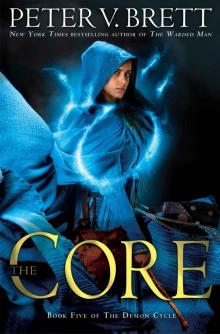 The Core
The Core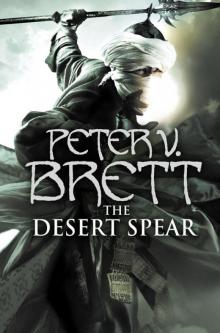 The Desert Spear
The Desert Spear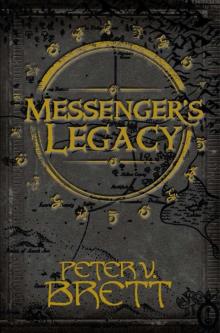 Messenger’s Legacy
Messenger’s Legacy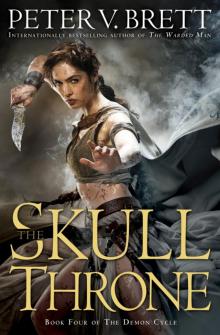 The Skull Throne
The Skull Throne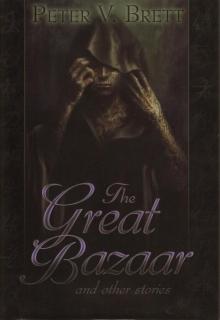 The Great Bazaar and Other Stories
The Great Bazaar and Other Stories The Daylight War
The Daylight War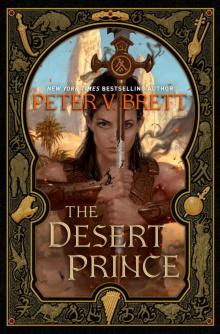 The Desert Prince
The Desert Prince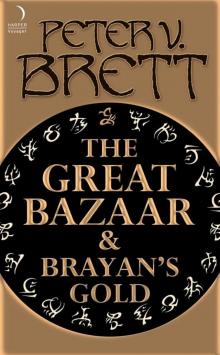 The Great Bazaar & Brayan's Gold
The Great Bazaar & Brayan's Gold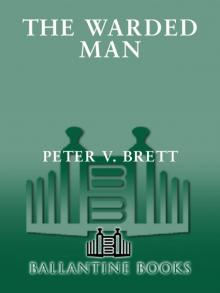 The Warded Man
The Warded Man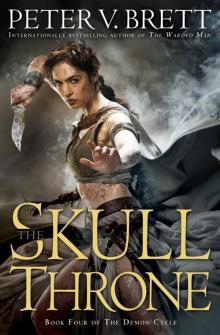 Demon Cycle 04 - The Skull Throne
Demon Cycle 04 - The Skull Throne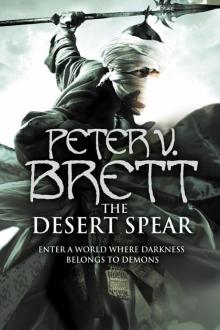 The Desert Spear (demon)
The Desert Spear (demon) The Painted Man d-1
The Painted Man d-1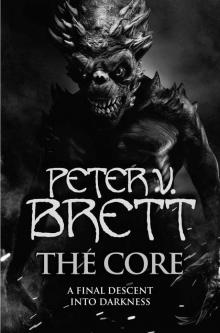 The Core (The Demon Cycle, Book 5)
The Core (The Demon Cycle, Book 5)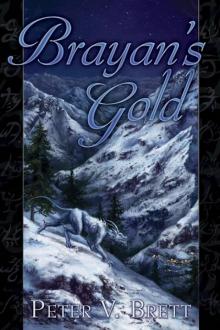 Brayan's Gold
Brayan's Gold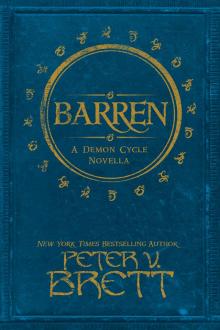 Barren
Barren